Module 9 Great inventions Units 1-2 课文语法知识点课件(共19张PPT)外研版九年级英语上册
文档属性
| 名称 | Module 9 Great inventions Units 1-2 课文语法知识点课件(共19张PPT)外研版九年级英语上册 |
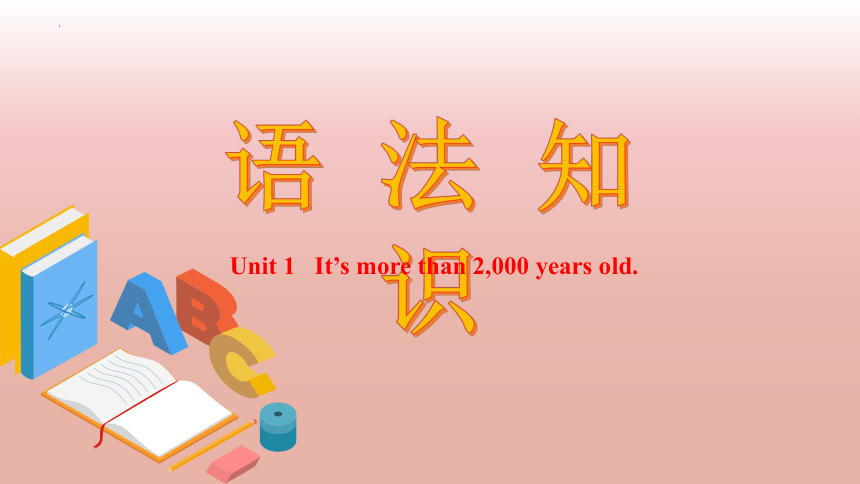
|
|
| 格式 | pptx | ||
| 文件大小 | 917.8KB | ||
| 资源类型 | 教案 | ||
| 版本资源 | 外研版 | ||
| 科目 | 英语 | ||
| 更新时间 | 2024-07-12 00:00:00 | ||
图片预览


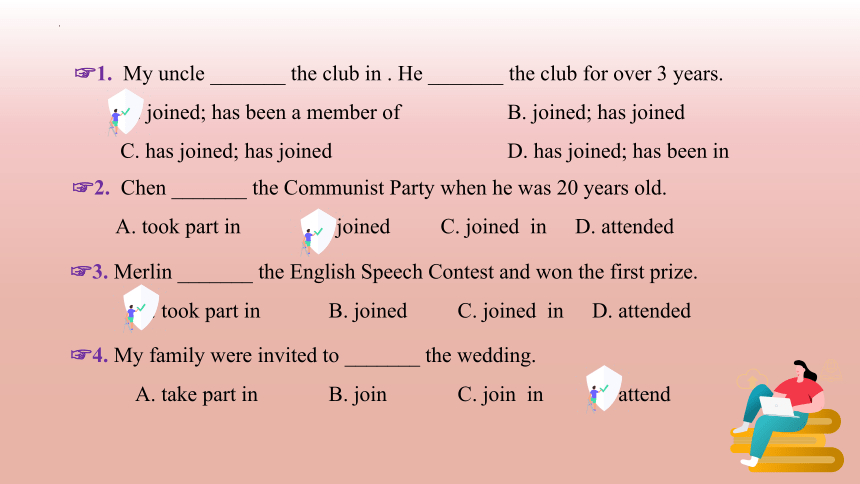

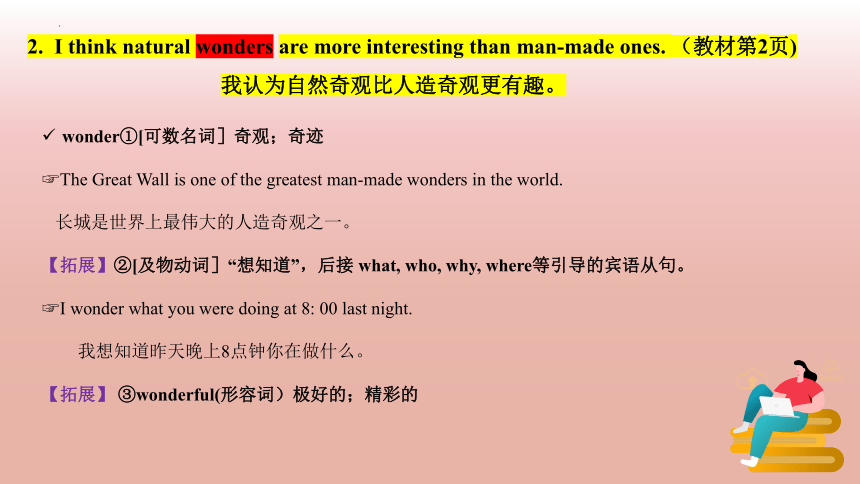
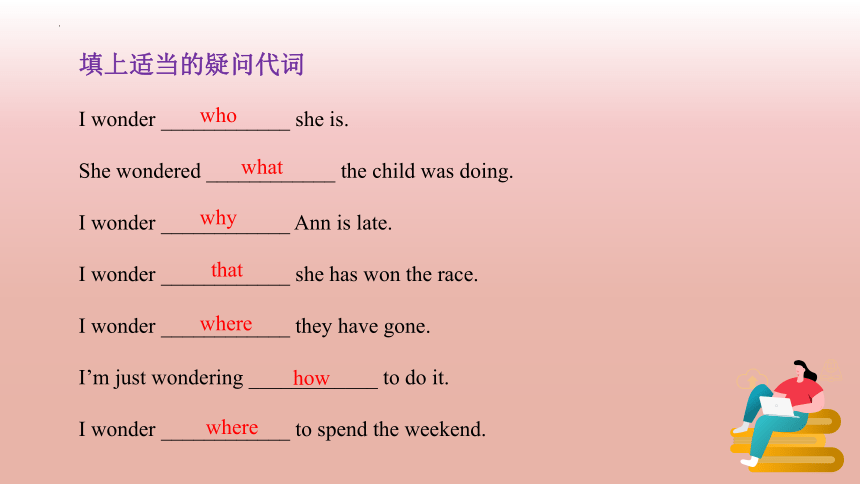
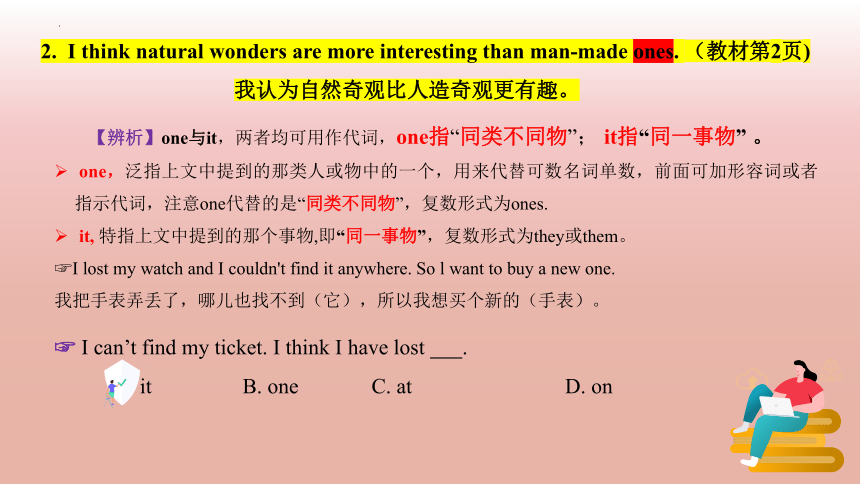
文档简介
(共19张PPT)
语 法 知 识
Unit 1 It’s more than 2,000 years old.
Let's call Wonders of the World and join in the discussion. (教材第2页)
让我们给《世界奇观》节目打电话,加入讨论吧。
【辨析】join in与take part in
join in “参加;加入(活动)”,指参加某项活动,加游戏、讨论等。
take part in “参加,参与(某事)”指参加某些活动或比赛,并在其中起积极作用。
回顾:join“加入某一组织,成为其中一员”,特别注意join是短暂性动词,不能用于延续性表达。
She listened carefully but didn’t ______________the conversation.
Will you ______________ the sports meeting next week
He ______________ the army after high school.
用join/join in/ take part in 进行适当形式填空
join in
take part in
joined
1. My uncle _______ the club in . He _______ the club for over 3 years.
A. joined; has been a member of B. joined; has joined
C. has joined; has joined D. has joined; has been in
2. Chen _______ the Communist Party when he was 20 years old.
A. took part in B. joined C. joined in D. attended
3. Merlin _______ the English Speech Contest and won the first prize.
A. took part in B. joined C. joined in D. attended
4. My family were invited to _______ the wedding.
A. take part in B. join C. join in D. attend
2. I think natural wonders are more interesting than man-made ones. (教材第2页)
我认为自然奇观比人造奇观更有趣。
natural[形容词]①“大自然的”
Victoria Falls is a natural wonder and the Terracotta Army is a man-made wonder.
维多利亚瀑布是自然奇观,而兵马俑是人造奇观。
natural [形容词]② “自然的,正常的;合乎常理的”
It is natural to feel nervous in a public speech.
在公共场合演讲感到紧张是很正常的。
【词根】 nature[不可数名词]“大自然;自然界”
我们应该保护大自然。
反义词为 man-made“人造的”
We need to protect the nature.
wonder①[可数名词]奇观;奇迹
The Great Wall is one of the greatest man-made wonders in the world.
长城是世界上最伟大的人造奇观之一。
【拓展】②[及物动词]“想知道”,后接 what, who, why, where等引导的宾语从句。
I wonder what you were doing at 8: 00 last night.
我想知道昨天晚上8点钟你在做什么。
【拓展】 ③wonderful(形容词)极好的;精彩的
2. I think natural wonders are more interesting than man-made ones. (教材第2页)
我认为自然奇观比人造奇观更有趣。
填上适当的疑问代词
I wonder ____________ she is.
She wondered ____________ the child was doing.
I wonder ____________ Ann is late.
I wonder ____________ she has won the race.
I wonder ____________ they have gone.
I’m just wondering ____________ to do it.
I wonder ____________ to spend the weekend.
who
what
how
why
where
that
where
2. I think natural wonders are more interesting than man-made ones. (教材第2页)
我认为自然奇观比人造奇观更有趣。
【辨析】one与it,两者均可用作代词,one指“同类不同物”; it指“同一事物” 。
one,泛指上文中提到的那类人或物中的一个,用来代替可数名词单数,前面可加形容词或者指示代词,注意one代替的是“同类不同物”,复数形式为ones.
it, 特指上文中提到的那个事物,即“同一事物”,复数形式为they或them。
I lost my watch and I couldn't find it anywhere. So l want to buy a new one.
我把手表弄丢了,哪儿也找不到(它),所以我想买个新的(手表)。
I can’t find my ticket. I think I have lost .
A. it B. one C. at D. on
3. It’s about 1,700 metres wide and 100 metres high. (教材第2页)
它大概1700米宽,100米高。
“基数词+名词复数(计量词)+形容词(long/wide/high/deep)”,如:
Jim is ten years old this year.
The river is about 2,000 metres long.
“基数词-名词单数(计量词)-形容词” ,如:
Han Hai is a twenty-year-old man.
“数词+名词复数(计量词)+in length/width/height/depth”,如:
The river is about 2,000 metres in length.
对“长、宽、高、深”等的提问用:How+长/宽/高/深+be+sth. 。
-How long/wide/deep is this river 这条河多长/宽/高?
Jim今年10岁。
这条河大约两千米长。
韩海是一位20岁的男子。
这条河大约两千米长。
Unit 2 The Grand Canyon was not just big.
I got out of the car, went through a gate and walked along a dark path. (教材第4页)
我从车里下来,穿过一个大门,沿着一条漆黑的小路走。
【辨析】get out of与get off
get out of 和get off都可表示“下车”,具体区别如下
get out of通常接car, taxi等小型交通工具,其反义短语为get into
get off通常接 bus, train, ship, plane等大型交通工具,其反义短语为get on
【介词辨析】through, across, over与past, along
over(从上方)越过
across(从物体表面)横穿过
through(从物体内部)穿过
past(从旁边)经过
along沿着
【练习】
She walked ____________the tunnel alone.
Go _____________ the road and you will see it.
A plane flew __________ the high mountain.
When I go to school, I go __________ a bus station.
她独自穿过隧道。
穿过这条马路你就看到它了。
一架飞机飞过高山。
我上学时经过一家公交站。
through
across
over
past
Last night a thief climbed into the old man's house ________the window.
across B. through C. past D. over
2. …a stranger appeared beside the path. 一个陌生人出现在了小路边。(教材第4页)
【辨析】beside与besides
beside [介词]“在·····旁边”
There is a big tree beside the house.
besides[介词]或[副词],意为“除了······之外(包含)”。
Besides Chinese, we have to study history and English.
补充: except“除了······之外(不包含)”
Nobody was late except Betty.
1. In the picture, he sits ______ me, looking very happy.
A. beside B. among C. up D. through
2. Everyone in our class went to the museum _______ Ruby, because she had a bad cold.
A. except B. towards C. without D. with
房子旁边有棵大树。
除了语文(语文也学),我们还必须学习历史和英语。
除了贝蒂,没人迟到(没迟到的人员中不包括Betty)。
3. "Yes, "he replied, "you'll get there in five minutes.” (教材第4页)
“是的,”他回答道,“五分钟后你就会到那儿。”
[动词](replied, replied) “回答;答复”, 常用作不及物动词,跟宾语时,后面加介词to.
The father didn't reply to his question at once. 父亲没有马上回答他的问题。
[名词]“回答;答复”
I asked him, but he gave no reply. 我问了他,但他没有回答。
注意:①answer作动词,意为“回答,答复”时,等于reply,但 reply 跟宾语时须与to连用。
You must reply to/answer this letter right away. 你必须马上回复这封信。
②answer可表示对电话、敲门等做出“应答”,reply则不能。
Who answered the telephone 谁接的电话?
③answer作名词,可数,意为“答案” 。
the answer to the question“问题的答案”
4. I looked over them, but it was silent and there was no sign of it. (教材第4页)
我向那些岩石上面望去,一片寂静,没有一点大峡谷的迹象。
look over :“从……上面望过去”
【补充】另一个常见意思:look over “查看,仔细检查”
Don’t forget to look over your schoolbag.
silent[形容词]①寂静的②不说话的,沉默的。
【补充】 silence[名词]寂静,无声。常考词组 in silence.
He didn’t say anything and just sat in silence.
sign在本句话中意为“迹象,征兆”。
补充另一个常见意思“标志,指示牌”。
Look at the sign, it reads “no smoking.”看指示牌,上面写着“禁止吸烟”。
另外sign还可用作动词,意为“签名,签约”。
Please sign here in the form.请在表格这里签名。
不要忘了检查你的书包
“in+名词”表示“在……状态”
in silence
in danger
in need
in surprise
in fear
in anger
in trouble
in action
5. Far below me, the ground fell away and down to a river. (教材第4页)
远远地在我下方,地面突然向下倾斜,退落到一条河。
below[介词] “在下面;在……以下”,反义词:above“在上面;超过”
零下八度 eight below zero
与fall 相关的常考短语:
fall away 突然向下倾斜
fall behind 落后
fall down 摔倒;倒塌
fall off 从……掉下,脱落
fall over 跌倒
6. If you put the two tallest buildings in the world on top of each other at the bottom of the canyon, they still would not reach the top.
on top of “在······上面”;在此句中表示将两个物体“叠加”。
【拓展】 at the top of “在······顶端”;at the bottom of“在······的底部”
We will have a picnic at the top of the hill.
We met at the bottom of the hill.
我们要在山顶野餐。
我们在山脚下碰面。
7. ….on both sides the canyon went far away for more than 200 miles.
……大峡谷向两边延伸200多英里。(教材第4页)
both
【形容词】“两者,两者都”。both作形容词时,其后修饰的名词必须用复数。
词组:both…and…
Both boys are from America.
Both the old and the young like the cartoon Monkey King.
两个男孩都来自美国。
老人孩子都喜欢《美猴王》动画。
辨析:both与all
Maggie and Stella __________my friends. We ____________ listening to music.
A. are both; all like B. are both; both like
C. both are; all like D. all are; all like
8. I remained by the canyon for about half an hour…
我在大峡谷旁边待了大约半小时……(教材第4页)
remain在本句话中是不及物动词,意为“逗留,留下”。
【拓展】remain另一个常见用法是做系动词,意为“仍然是,保持”
She remains healthy after many years.
by[介词]意为 “在······旁边;靠近”。
We had a picnic by the lake in the Park.
多年以后,她仍然保持健康。
我们在公园的湖边吃野餐。
9. It is famous for...“它因·····而闻名”。(教材第5页)
【辨析】be famous for与be famous as
be famous for“因……而出名”,其后一般接出名的原因。
be famous as“作为……而出名”,其后一般接表示职业或身份的词。
China is famous/ known for the Great Wall.
Yao Ming is famous/ well-known as a great basketball player.
= be known for = be well-known for
= be known as = be well-known as
中国因为长城而闻名。
姚明作为一名出色的篮球运动员而出名。
语 法 知 识
Unit 1 It’s more than 2,000 years old.
Let's call Wonders of the World and join in the discussion. (教材第2页)
让我们给《世界奇观》节目打电话,加入讨论吧。
【辨析】join in与take part in
join in “参加;加入(活动)”,指参加某项活动,加游戏、讨论等。
take part in “参加,参与(某事)”指参加某些活动或比赛,并在其中起积极作用。
回顾:join“加入某一组织,成为其中一员”,特别注意join是短暂性动词,不能用于延续性表达。
She listened carefully but didn’t ______________the conversation.
Will you ______________ the sports meeting next week
He ______________ the army after high school.
用join/join in/ take part in 进行适当形式填空
join in
take part in
joined
1. My uncle _______ the club in . He _______ the club for over 3 years.
A. joined; has been a member of B. joined; has joined
C. has joined; has joined D. has joined; has been in
2. Chen _______ the Communist Party when he was 20 years old.
A. took part in B. joined C. joined in D. attended
3. Merlin _______ the English Speech Contest and won the first prize.
A. took part in B. joined C. joined in D. attended
4. My family were invited to _______ the wedding.
A. take part in B. join C. join in D. attend
2. I think natural wonders are more interesting than man-made ones. (教材第2页)
我认为自然奇观比人造奇观更有趣。
natural[形容词]①“大自然的”
Victoria Falls is a natural wonder and the Terracotta Army is a man-made wonder.
维多利亚瀑布是自然奇观,而兵马俑是人造奇观。
natural [形容词]② “自然的,正常的;合乎常理的”
It is natural to feel nervous in a public speech.
在公共场合演讲感到紧张是很正常的。
【词根】 nature[不可数名词]“大自然;自然界”
我们应该保护大自然。
反义词为 man-made“人造的”
We need to protect the nature.
wonder①[可数名词]奇观;奇迹
The Great Wall is one of the greatest man-made wonders in the world.
长城是世界上最伟大的人造奇观之一。
【拓展】②[及物动词]“想知道”,后接 what, who, why, where等引导的宾语从句。
I wonder what you were doing at 8: 00 last night.
我想知道昨天晚上8点钟你在做什么。
【拓展】 ③wonderful(形容词)极好的;精彩的
2. I think natural wonders are more interesting than man-made ones. (教材第2页)
我认为自然奇观比人造奇观更有趣。
填上适当的疑问代词
I wonder ____________ she is.
She wondered ____________ the child was doing.
I wonder ____________ Ann is late.
I wonder ____________ she has won the race.
I wonder ____________ they have gone.
I’m just wondering ____________ to do it.
I wonder ____________ to spend the weekend.
who
what
how
why
where
that
where
2. I think natural wonders are more interesting than man-made ones. (教材第2页)
我认为自然奇观比人造奇观更有趣。
【辨析】one与it,两者均可用作代词,one指“同类不同物”; it指“同一事物” 。
one,泛指上文中提到的那类人或物中的一个,用来代替可数名词单数,前面可加形容词或者指示代词,注意one代替的是“同类不同物”,复数形式为ones.
it, 特指上文中提到的那个事物,即“同一事物”,复数形式为they或them。
I lost my watch and I couldn't find it anywhere. So l want to buy a new one.
我把手表弄丢了,哪儿也找不到(它),所以我想买个新的(手表)。
I can’t find my ticket. I think I have lost .
A. it B. one C. at D. on
3. It’s about 1,700 metres wide and 100 metres high. (教材第2页)
它大概1700米宽,100米高。
“基数词+名词复数(计量词)+形容词(long/wide/high/deep)”,如:
Jim is ten years old this year.
The river is about 2,000 metres long.
“基数词-名词单数(计量词)-形容词” ,如:
Han Hai is a twenty-year-old man.
“数词+名词复数(计量词)+in length/width/height/depth”,如:
The river is about 2,000 metres in length.
对“长、宽、高、深”等的提问用:How+长/宽/高/深+be+sth. 。
-How long/wide/deep is this river 这条河多长/宽/高?
Jim今年10岁。
这条河大约两千米长。
韩海是一位20岁的男子。
这条河大约两千米长。
Unit 2 The Grand Canyon was not just big.
I got out of the car, went through a gate and walked along a dark path. (教材第4页)
我从车里下来,穿过一个大门,沿着一条漆黑的小路走。
【辨析】get out of与get off
get out of 和get off都可表示“下车”,具体区别如下
get out of通常接car, taxi等小型交通工具,其反义短语为get into
get off通常接 bus, train, ship, plane等大型交通工具,其反义短语为get on
【介词辨析】through, across, over与past, along
over(从上方)越过
across(从物体表面)横穿过
through(从物体内部)穿过
past(从旁边)经过
along沿着
【练习】
She walked ____________the tunnel alone.
Go _____________ the road and you will see it.
A plane flew __________ the high mountain.
When I go to school, I go __________ a bus station.
她独自穿过隧道。
穿过这条马路你就看到它了。
一架飞机飞过高山。
我上学时经过一家公交站。
through
across
over
past
Last night a thief climbed into the old man's house ________the window.
across B. through C. past D. over
2. …a stranger appeared beside the path. 一个陌生人出现在了小路边。(教材第4页)
【辨析】beside与besides
beside [介词]“在·····旁边”
There is a big tree beside the house.
besides[介词]或[副词],意为“除了······之外(包含)”。
Besides Chinese, we have to study history and English.
补充: except“除了······之外(不包含)”
Nobody was late except Betty.
1. In the picture, he sits ______ me, looking very happy.
A. beside B. among C. up D. through
2. Everyone in our class went to the museum _______ Ruby, because she had a bad cold.
A. except B. towards C. without D. with
房子旁边有棵大树。
除了语文(语文也学),我们还必须学习历史和英语。
除了贝蒂,没人迟到(没迟到的人员中不包括Betty)。
3. "Yes, "he replied, "you'll get there in five minutes.” (教材第4页)
“是的,”他回答道,“五分钟后你就会到那儿。”
[动词](replied, replied) “回答;答复”, 常用作不及物动词,跟宾语时,后面加介词to.
The father didn't reply to his question at once. 父亲没有马上回答他的问题。
[名词]“回答;答复”
I asked him, but he gave no reply. 我问了他,但他没有回答。
注意:①answer作动词,意为“回答,答复”时,等于reply,但 reply 跟宾语时须与to连用。
You must reply to/answer this letter right away. 你必须马上回复这封信。
②answer可表示对电话、敲门等做出“应答”,reply则不能。
Who answered the telephone 谁接的电话?
③answer作名词,可数,意为“答案” 。
the answer to the question“问题的答案”
4. I looked over them, but it was silent and there was no sign of it. (教材第4页)
我向那些岩石上面望去,一片寂静,没有一点大峡谷的迹象。
look over :“从……上面望过去”
【补充】另一个常见意思:look over “查看,仔细检查”
Don’t forget to look over your schoolbag.
silent[形容词]①寂静的②不说话的,沉默的。
【补充】 silence[名词]寂静,无声。常考词组 in silence.
He didn’t say anything and just sat in silence.
sign在本句话中意为“迹象,征兆”。
补充另一个常见意思“标志,指示牌”。
Look at the sign, it reads “no smoking.”看指示牌,上面写着“禁止吸烟”。
另外sign还可用作动词,意为“签名,签约”。
Please sign here in the form.请在表格这里签名。
不要忘了检查你的书包
“in+名词”表示“在……状态”
in silence
in danger
in need
in surprise
in fear
in anger
in trouble
in action
5. Far below me, the ground fell away and down to a river. (教材第4页)
远远地在我下方,地面突然向下倾斜,退落到一条河。
below[介词] “在下面;在……以下”,反义词:above“在上面;超过”
零下八度 eight below zero
与fall 相关的常考短语:
fall away 突然向下倾斜
fall behind 落后
fall down 摔倒;倒塌
fall off 从……掉下,脱落
fall over 跌倒
6. If you put the two tallest buildings in the world on top of each other at the bottom of the canyon, they still would not reach the top.
on top of “在······上面”;在此句中表示将两个物体“叠加”。
【拓展】 at the top of “在······顶端”;at the bottom of“在······的底部”
We will have a picnic at the top of the hill.
We met at the bottom of the hill.
我们要在山顶野餐。
我们在山脚下碰面。
7. ….on both sides the canyon went far away for more than 200 miles.
……大峡谷向两边延伸200多英里。(教材第4页)
both
【形容词】“两者,两者都”。both作形容词时,其后修饰的名词必须用复数。
词组:both…and…
Both boys are from America.
Both the old and the young like the cartoon Monkey King.
两个男孩都来自美国。
老人孩子都喜欢《美猴王》动画。
辨析:both与all
Maggie and Stella __________my friends. We ____________ listening to music.
A. are both; all like B. are both; both like
C. both are; all like D. all are; all like
8. I remained by the canyon for about half an hour…
我在大峡谷旁边待了大约半小时……(教材第4页)
remain在本句话中是不及物动词,意为“逗留,留下”。
【拓展】remain另一个常见用法是做系动词,意为“仍然是,保持”
She remains healthy after many years.
by[介词]意为 “在······旁边;靠近”。
We had a picnic by the lake in the Park.
多年以后,她仍然保持健康。
我们在公园的湖边吃野餐。
9. It is famous for...“它因·····而闻名”。(教材第5页)
【辨析】be famous for与be famous as
be famous for“因……而出名”,其后一般接出名的原因。
be famous as“作为……而出名”,其后一般接表示职业或身份的词。
China is famous/ known for the Great Wall.
Yao Ming is famous/ well-known as a great basketball player.
= be known for = be well-known for
= be known as = be well-known as
中国因为长城而闻名。
姚明作为一名出色的篮球运动员而出名。
同课章节目录
- Module 1 Wonders of the world
- Unit 1 It's more than 2,000 years old.
- Unit 2 The Grand Canyon was not just big.
- Unit 3 Language in use
- Module 2 Public holidays
- Unit 1 My family always go somewhere interesting a
- Unit 2 We have celebrated the festival since the f
- Unit 3 Language in use
- Module 3 Heroes
- Unit 1 She trained hard,so she became a great play
- Unit 2There were few doctors, so he had to work ve
- Unit 3 Language in use
- Module 4 Home alone
- Unit 1 I can look after myself, although it won’t
- Unit 2 I became so bored with their orders that I
- Unit 3 Language in use
- Module 5 Museums
- Unit 1 Don't cross that rope!
- Unit 2 If you ever go to London, make sure you vis
- Unit 3 Language in use
- Module 6 Problems
- Unit 1 If I start after dinner, I'll finish it be
- Unit 2 If you tell him the truth now, you will sho
- Unit 3 Language in use
- Revision Module A
- Module 7 Great books
- Unit 1 We're still influenced by Confucius's idea
- Unit 2 It is still read and loved.
- Unit 3 Language in use
- Module 8 Sports life
- Unit 1 Daming wasn't chosen for the team last time
- Unit 2 He was invited to competitions around the w
- Unit 3 Language in use
- Module 9 Great inventions
- Unit 1 Will computers be used more than books in t
- Unit 2 Will books be replaced by the Internet?
- Unit 3 Language in use
- Module 10 Australia
- Unit 1 I have some photos that I took in Australia
- Unit 2 The game that they like most is Australian
- Unit 3 Language in use
- Module 11 Photos
- Unit 1 He's the boy who won the photo competition
- Unit 2 The photo which we liked best was taken by
- Unit 3 Language in use
- Module 12 Save our world
- Unit 1 If everyone starts to do something, the wor
- Unit 2 Repeat these three words daily: reduce, reu
- Unit 3 Language in use
- Revision Module B
